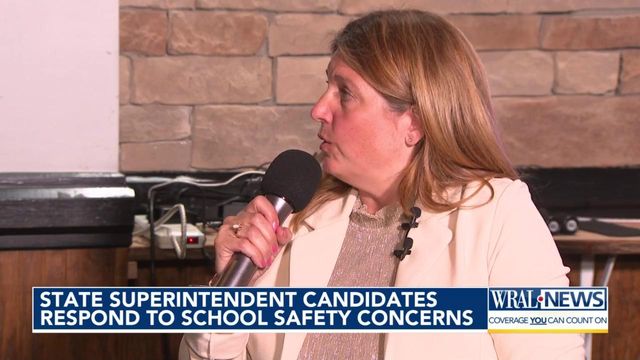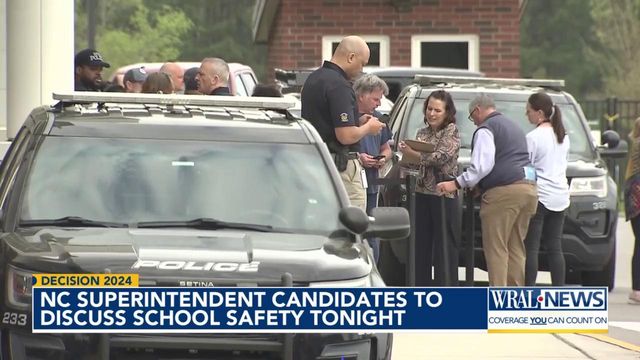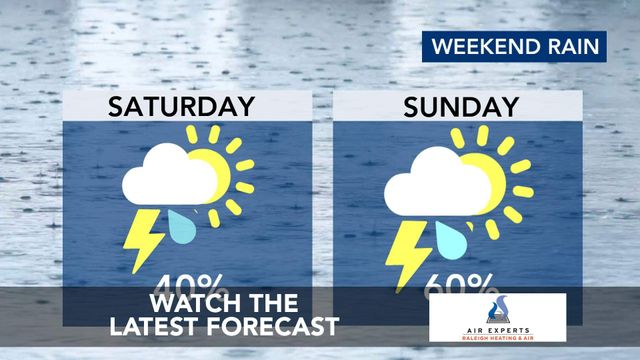State superintendent candidates weigh in on school safety
School safety is a key issue for many people in North Carolina, and the subject is top-of-mind as the state heads toward the November elections.
“It’s constantly on the news — school shootings, kids losing their lives, whether it be mental illness or just the school not doing their thing as far as securing the classrooms,” Raleigh resident Ashley De Los Santos told WRAL News Tuesday as she was leaving a pet store on Glenwood Avenue.
“It’s just not safe anymore, it seems like,” Gloria Brown, a parent of grown children, said outside a Target in northwest Raleigh.
Data shows that schools generally are still one of the safest places for children to be. But at least one North Carolina student has died from violence at school in each of the past three school years.
Schools are still relatively safe places. Just 3% of youth homicides take place at schools, according to the National Institute of Justice. Few students nationally fear being attacked or harmed at school, federal data shows. And most North Carolina teachers describe their schools as safe, according to 2022 state data. But incidents such as the deadly stabbing at Southeast Raleigh High School last year, a 2022 deadly stabbing in Jacksonville and a 2021 deadly shooting in Winston-Salem have raised fears among parents.
Candidates for state schools superintendent have keyed in on those fears, focusing in part on school safety as they seek to run the state’s public schools. In interviews and at events, the candidates have begun zeroing in on the issue, addressing how they’d work to improve school safety.
Michele Morrow
Republican Michele Morrow is a homeschool educator who mounted a surprise victory in the March 5 Republican primary, unseating incumbent Catherine Truitt. She’s running against Democrat Mo Green, a career public school administrator.
Morrow has come under scrutiny for past comments, including calling public schools "indoctrination centers" and telling parents not to send their kids to public schools. Democrats and some Republicans have also criticized her past social media posts, including at least one calling for the execution of former President Barack Obama.
Morrow says public schools are failing because of lack of discipline and violent student behavior.
“Our students and our staff don’t feel safe,” she told WRAL in an interview on Tuesday ahead of a panel in Cary during which she outlined her priorities for school safety.
During that event Morrow also introduced various experts and political supporters who she has named to an advisory panel on school safety. One of them is Scott Lassiter, a Republican candidate for a state Senate seat this year who's also an assistant principal for the Wake County Public Schools System. He said school safety and discipline need to be the top priority.
“If teachers don’t feel safe, if students don’t feel safe, you can’t engage in the act of teaching and learning," Lassiter said.
During the event, and in the earlier interview, Morrow touched on a wide range of proposed fixes. Those include putting cameras in classrooms, hiring more school resource officers and making schools teach what she called "true history," a topic she didn't define during her speech other than as a replacement for "CRT and DEI" — shorthand for critical race theory and diversity, equity and inclusion.
Morrow is also calling for tougher consequences for students and more authority for teachers to control their classrooms.
“I even believe we should make assaulting a staff member of a school be up there with assaulting a police officer in terms of the penalty,” Morrow told WRAL in the interview.
In many cases, assaults are misdemeanors punishable by a fine or probation. But assaults on police officers are felonies punishable by up as much as two years in prison, in cases with minor injuries like scrapes or bruises. Morrow said heftier penalties will force troublesome students to act better, and hopefully become more productive members of society later in life.
"We have to take that on as the responsibility of our schools, especially if it is not happening in our homes," she said at the panel Tuesday.
Mo Green
Green is a former Guilford County Schools superintendent and former deputy superintendent of Charlotte-Mecklenburg Schools — roles that over 15 years included experience coordinating law enforcement in schools, in two of the state's three biggest school districts.
Green said some schools do face discipline problems, and some may need more resource officers. But that’s not the case everywhere in the state, he told WRAL. “I don’t want us to believe that our schools are sort of this haven for inappropriate activity,” Green said. “I think that’s a false narrative.”
Green said he would take a comprehensive approach to improving school safety, including more social workers and counselors in schools to help students who are struggling. There are cases, he said, where involving law enforcement in a school disciplinary issue isn't the most productive solution.
"Many youth in North Carolina are dealing with serious mental health crisis situations," he said. "And we must continue to be sure that we are investing in mental health professionals to support our students. And it's not one or the other, to be abundantly clear about that. It's not just mental health professionals versus school resource officers. We need both."
Green said he would also advocate for character development education as part of his plan.
“That's something that we certainly focused on quite a bit when I was superintendent of Guilford County Schools, making that equally as important as academic outcomes,” Green said.
Asked about cameras in classrooms, Green said he sees upsides and downsides. They can aid remote learning for students who are sick or otherwise can’t attend school in person, he said. They also can give students more access to a limited class, perhaps one that can be taught across school districts. He worries about broadcasting students’ performance.
“There are going to be situations where we’ve got to be careful about how students are perceived in classrooms,” Green said, suggesting certain protections would have to be put in place if cameras became widespread in classrooms. “... There are certain students that might, for example, be struggling with certain subject matter, and the way that the teacher is working with those students is not something that I believe should just be broadcast and made available to others.”
Morrow Green were in a statistical dead heat in the race last month, according to a WRAL News Poll conducted between March 3 and March 9. Morrow held 41% of the vote, while Green had 40% in the race to become the state’s superintendent of public instruction. Nineteen percent of respondents were undecided.
The poll, conducted in partnership with SurveyUSA between March 3 and March 9, had a credibility interval of 4.9 percentage points. A credibility interval is similar to margin of error but takes into account more factors and is considered by some pollsters to be a more accurate measurement of statistical certainty.
North Carolina has been working to make schools safer in recent years, requiring schools to create threat assessment teams — groups of school- or district-level employees that field concerns about student behavior and decide how to act on them.
North Carolina will be the latest among a handful of states requiring the teams, following the enactment of a law passed last year.
But some county school leaders say they need more money for facilities, employee pay and safety measures. Leaders from school districts across the state told WRAL last year that they need more funds for security upgrades to make older schools more fortified against outsiders, as well as funding for security vestibules to keep school doors locked to visitors until office staff can verify their identity and approve their entry.
WRAL state government reporter Will Doran contributed to this report.













